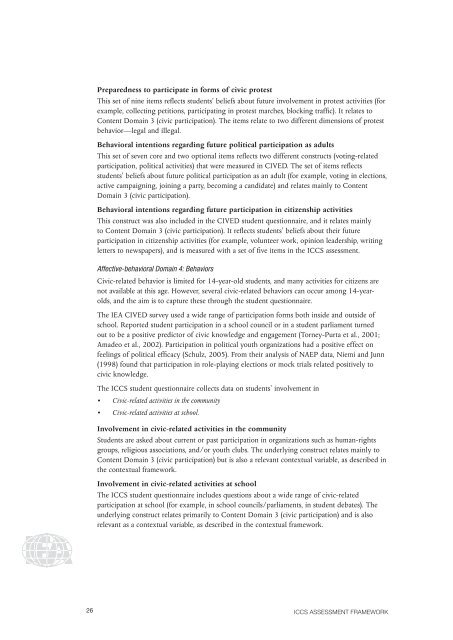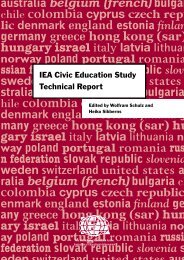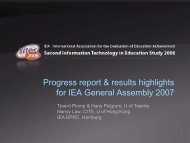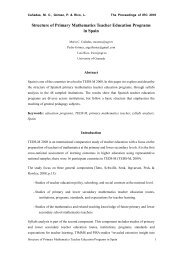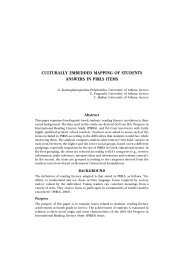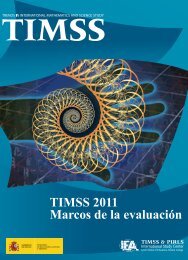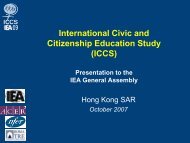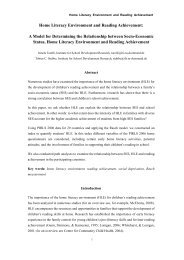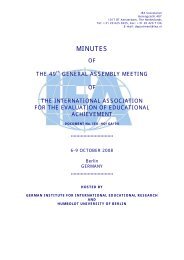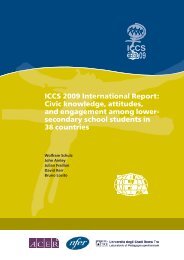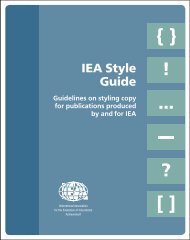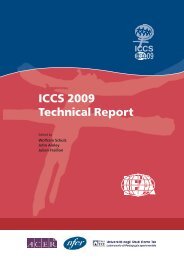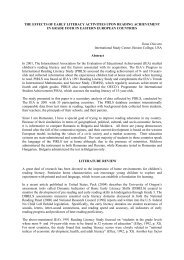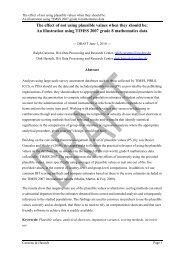International civic and citizenship education study - iccs - IEA
International civic and citizenship education study - iccs - IEA
International civic and citizenship education study - iccs - IEA
- TAGS
- civic
- citizenship
- iccs
- www.iea.nl
You also want an ePaper? Increase the reach of your titles
YUMPU automatically turns print PDFs into web optimized ePapers that Google loves.
Preparedness to participate in forms of <strong>civic</strong> protest<br />
This set of nine items reflects students’ beliefs about future involvement in protest activities (for<br />
example, collecting petitions, participating in protest marches, blocking traffic). It relates to<br />
Content Domain 3 (<strong>civic</strong> participation). The items relate to two different dimensions of protest<br />
behavior—legal <strong>and</strong> illegal.<br />
Behavioral intentions regarding future political participation as adults<br />
This set of seven core <strong>and</strong> two optional items reflects two different constructs (voting-related<br />
participation, political activities) that were measured in CIVED. The set of items reflects<br />
students’ beliefs about future political participation as an adult (for example, voting in elections,<br />
active campaigning, joining a party, becoming a c<strong>and</strong>idate) <strong>and</strong> relates mainly to Content<br />
Domain 3 (<strong>civic</strong> participation).<br />
Behavioral intentions regarding future participation in <strong>citizenship</strong> activities<br />
This construct was also included in the CIVED student questionnaire, <strong>and</strong> it relates mainly<br />
to Content Domain 3 (<strong>civic</strong> participation). It reflects students’ beliefs about their future<br />
participation in <strong>citizenship</strong> activities (for example, volunteer work, opinion leadership, writing<br />
letters to newspapers), <strong>and</strong> is measured with a set of five items in the ICCS assessment.<br />
Affective-behavioral Domain 4: Behaviors<br />
Civic-related behavior is limited for 14-year-old students, <strong>and</strong> many activities for citizens are<br />
not available at this age. However, several <strong>civic</strong>-related behaviors can occur among 14-yearolds,<br />
<strong>and</strong> the aim is to capture these through the student questionnaire.<br />
The <strong>IEA</strong> CIVED survey used a wide range of participation forms both inside <strong>and</strong> outside of<br />
school. Reported student participation in a school council or in a student parliament turned<br />
out to be a positive predictor of <strong>civic</strong> knowledge <strong>and</strong> engagement (Torney-Purta et al., 2001;<br />
Amadeo et al., 2002). Participation in political youth organizations had a positive effect on<br />
feelings of political efficacy (Schulz, 2005). From their analysis of NAEP data, Niemi <strong>and</strong> Junn<br />
(1998) found that participation in role-playing elections or mock trials related positively to<br />
<strong>civic</strong> knowledge.<br />
The ICCS student questionnaire collects data on students’ involvement in<br />
• Civic-related activities in the community<br />
• Civic-related activities at school.<br />
Involvement in <strong>civic</strong>-related activities in the community<br />
Students are asked about current or past participation in organizations such as human-rights<br />
groups, religious associations, <strong>and</strong>/or youth clubs. The underlying construct relates mainly to<br />
Content Domain 3 (<strong>civic</strong> participation) but is also a relevant contextual variable, as described in<br />
the contextual framework.<br />
Involvement in <strong>civic</strong>-related activities at school<br />
The ICCS student questionnaire includes questions about a wide range of <strong>civic</strong>-related<br />
participation at school (for example, in school councils/parliaments, in student debates). The<br />
underlying construct relates primarily to Content Domain 3 (<strong>civic</strong> participation) <strong>and</strong> is also<br />
relevant as a contextual variable, as described in the contextual framework.<br />
26 ICCS ASSeSSment FrAmework


